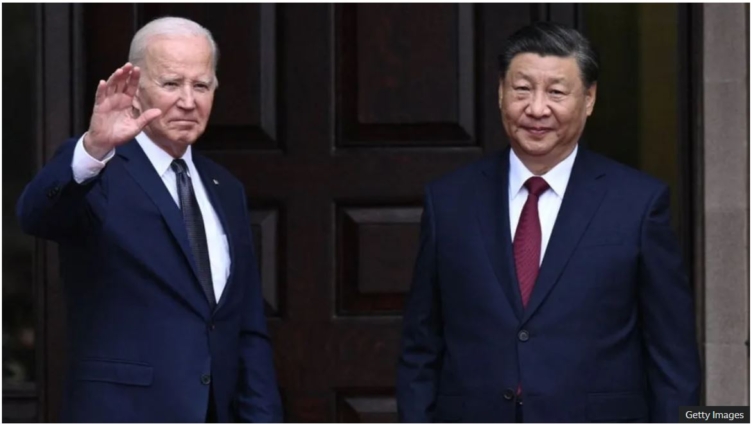US President Joe Biden and Chinese President Xi Jinping held a call on Tuesday in an effort to keep tensions between the two countries at a simmer.
They discussed avenues of cooperation, including recent shared efforts to combat climate change and narcotics, according to summaries of the call.
But there was significant disagreement on Taiwan and economic issues.
Mr Biden stressed support for Taiwan, but Mr Xi called US interference in the South China Sea a "red line".
Mr Xi also took issue with sanctions the US has put on China and Chinese-owned companies, calling it an "endless stream of measures to suppress China's economy, trade, science and technology".
"If the United States insists on suppressing China's high-tech development and depriving China of its legitimate right to development, we will not sit idly by," the Chinese leader said, according to a state media summary.
Despite the areas of disagreement, the White House and Chinese state media described the conversation as "candid and constructive". The conversation ranged from AI concerns to military communications.
"I look forward to responsibly managing our relationship in the weeks and months ahead," Mr Biden wrote on X, formerly Twitter, after acknowledging points of tensions.
While the discussion did not significantly the status of the countries' relationship, experts said that may not be the point.
The call was "largely performative and an attempt to show the rest of the world that in fact the countries are committed to managing the relationship well - even though the negative dynamics in the relationship has not changed," Robert Daly, director of the Wilson Center's Kissinger Institute on China and the United States, said.
But that does not mean that the divisions expressed on the call, which lasted an hour and 45 minutes, were inconsequential.
Mr Xi stresses that Washington's support of Taiwan and pursuit of sanctions against China was "not 'risk reduction' but risk creation," the summary says.
President Biden did not shrink from his administration's backing of the Taiwanese government, according to the White House summary.
The American president stressed the US's view that it was essential to maintain "peace and stability across the Taiwan Strait" and "the rule of law and freedom of navigation in the South China Sea". But Mr Biden also challenged Mr Xi on China's continued support for Russia's defence industrial base, its trade policies, and national security threats to the United States, the White House readout said.
"For China, there is no other issue more important than Taiwan," Yun Sun, senior fellow and co-director of the East Asia program at the Stimson Center, said of the call. "But for the US, there are other issues as well."
Mr Daly emphasised that despite both readouts placing a focus on cooperation and conversation, "this is not a sign of a thaw" between the two superpowers.
"Both leaders have an interest in demonstrating responsible management of what they both know can be a very contentious relationship in the long term," Mr Daly said.
This is all about damage control and doing what you can," he added, "But neither leader is looking for an opening to change the tenor of the relationship."
The two presidents previously met in November at the Asia-Pacific Economic Cooperation (Apec) summit in San Francisco, California, where they agreed to address climate change and fentanyl trafficking. The meeting was widely viewed as an effort to cool tensions between Beijing and Washington after the Chinese spy balloon incident last year.
The two leaders' discussion, which the White House said again touched on climate change and drug trafficking, comes ahead of several events that could prove crucial to US-China relationship.
Next month, Taiwan will hold an inauguration for its president-elect, William Lai Ching-te, who Beijing has called a "troublemaker" and "separatist."."
The event likely loomed over the Biden-Xi call, said Ms Sun.
"The inauguration of the Taiwan president is coming up, so there is a need for China to emphasise that the US must tread carefully," she said said.
There are several key diplomatic meetings for the US and China on the horizon.
US Treasury Secretary Janet Yellen will soon visit China - after an American business delegation met with Mr Xi last week - and US Secretary of State Antony Blinken is expected to make a trip in the coming weeks.
Latest Stories
-
We’ll embrace cutting-edge technologies to address emerging healthcare needs – Prof. Antwi-Kusi
13 minutes -
Nana Aba Anamoah, Cwesi Oteng to attend Philip Nai and Friends’ charity event
18 minutes -
Environmental protection officers receive training on how to tackle climate change
21 minutes -
CLOGSAG vows to resist partisan appointments in Civil, Local Government Service
2 hours -
Peasant Farmers Association welcomes Mahama’s move to rename Agric Ministry
2 hours -
NDC grateful to chiefs, people of Bono Region -Asiedu Nketia
2 hours -
Ban on smoking in public: FDA engages food service establishments on compliance
2 hours -
Mahama’s administration to consider opening Ghana’s Mission in Budapest
2 hours -
GEPA commits to building robust systems that empower MSMEs
2 hours -
Twifo Atti-Morkwa poultry farmers in distress due to high cost of feed
2 hours -
Central Region PURC assures residents of constant water, power supply during yuletide
2 hours -
Election victory not licence to misbehave – Police to youth
2 hours -
GPL 2024/2025: Nations thrash struggling Legon Cities
2 hours -
Electoral offences have no expiry date, accountability is inevitable – Fifi Kwetey
2 hours -
Ghanaians to enjoy reliable electricity this Christmas – ECG promises
2 hours

